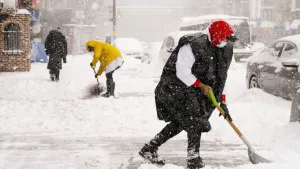More Stories
The Red Cross put together some tips that will help keep residents stay safe during a snowstorm:
COLD WEATHER/WINTER STORM SAFETY
1. Listen to local news channels for critical information on snowstorms and blizzards from the National Weather Service.
2. Avoid driving when conditions include sleet, freezing rain, snow or dense fog.
3. If travel is necessary, make sure you have a disaster supplies kit in your vehicle which includes: shovel, blanket, flashlight, water, snacks, first aid kit, extra batteries, sack of sand or cat litter.
MORE: Does your car battery have enough juice to make it through winter? Here are some tips to maintain it
4. Keep the gas tank full. A full tank will keep the fuel line from freezing.
5. Before tackling strenuous tasks in cold temperatures, consider your physical condition, the weather factors and the nature of the task.
6. When shoveling snow, take frequent breaks to avoid risk of injury or cardiac arrest.
7. Protect yourself from frostbite and hypothermia by wearing warm, loose-fitting, lightweight clothing in several layers. Stay indoors, if possible.
8. Bring pets inside during winter weather.
9. Make sure coats, gloves or mittens, hats, boots and warm clothing are available for all household members, along with extra blankets.
10. Eat regular meals and stay hydrated, but avoid caffeinated or alcoholic beverages.
Click here for more information from the Red Cross on winter storm preparedness.
HOME HEATING SAFETY
11. Heating fires are the second leading cause of home fires. Keep all potential sources of fuel like paper, clothing, bedding or rugs at least three feet away from space heaters, stoves, or fireplaces.
12. Portable heaters and fireplaces should never be left unattended. Turn off space heaters and make sure any embers in the fireplace are extinguished before going to bed or leaving home.
13. If you must use a space heater, place it on a level, hard and nonflammable surface (such as ceramic tile floor), not on rugs or carpets or near bedding or drapes. Keep children and pets away from space heaters.
14. Never use a cooking range or oven to heat your home.
15. Keep fire in your fireplace by using a glass or metal fire screen large enough to catch sparks and rolling logs.
16. It is critical that households have working smoke alarms and that families practice their fire escape plan.
POWER OUTAGE
17. Use flashlights for light, not candles.
18. Keep the refrigerator and freezer doors closed as much as possible. Check refrigerated food for spoilage and if in doubt, throw it out. Your refrigerator will keep cold for about 4 hours. If the freezer is full, it will keep its temperature for about 48 hours.
19. Have coolers on hand and surround your food with ice in the cooler or refrigerator to keep food cold for a longer period of time. Keep the refrigerator and freezer doors closed as much as possible.
POWER CENTER: Electric outage resources
20. Turn off and unplug all unnecessary electrical equipment and any appliances, equipment or electronics to avoid damaging them when the power is restored.
21. Avoid unnecessary travel as traffic lights will be out and roads congested.
Click here for more power outage safety tips from the Red Cross.
USING A GENERATOR
22. If someone is planning to use a generator, never use it indoors, including in a garage, carport, basement, crawlspace or other area, even with ventilation. Generators put off carbon monoxide fumes, which can be deadly.
Prepare for power outages with these six lifesaving generator safety tips.
DOWNED WIRES
23. Downed wires should always be considered “live.” Stay at least 30 feet away from downed power lines and immediately call 911 to report downed wires. Electric current passes easily through water, so stay away from downed power lines and electrical wires. Don't drive over, and don't stand near, downed power lines. Downed lines will be hard to see in the snow, and can potentially be hidden in standing water. If you encounter large pools of slush or standing water, stop, back up and choose another path.
TRAVEL SAFETY: 20 tips to help you travel safely during winter storms
24. The Postal Service asks customers to help keep their letter carrier safe this winter during storms. They ask residents to clear enough snow from curbside boxes to allow mail trucks to approach the box, deliver the mail and to drive away from the box without danger of the need for backing up. Walkways should be cleared of snow and ice and allow enough traction to avoid slips, trips or falls. Steps should also be kept clear of ice and snow and in good repair so as not to cause injury to the letter carriers or others who visit the customer’s home. Overhangs should be clear and free of snow and ice to avoid injury.
BABIES WINTER SLEEP SAFETY
25. Avoid bringing the baby into bed with you, even if you think it will keep the baby warmer. A baby must never sleep in an adult bed, on a couch or on a chair with anyone. Babies may suffocate if another person accidently rolls on top of them or covers their nose and mouth. When worried about a baby getting cold, dress them in a wearable blanket, such as a sleep sack, or in another layer of infant clothing.
More from News 12
1:40

STORM WATCH: Winter weather threat is increasing for Presidents Day
1:37

Warmer temps finally on the way after brutal stretch
0:55

IT’S TIME TO SHOVEL! 10 tips to help you dig out safely
2:06

Snow Day? NYC preps for major weekend winter storm

Hurricane Hunters assisting in tracking expected winter storm across tri-state
1:15
